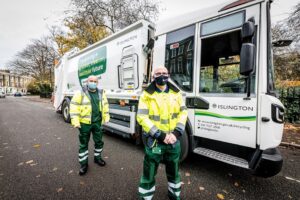Striking differences in air quality between affluent, largely white neighbourhoods and minority areas have been identified, again.
Black, Asian, and other minority residents in UK cities are being exposed to illegal levels of air pollution more frequently than any other ethnicities in the country, according to a major new report.
Research undertaken by the Runnymeade Trust UK and Greenpeace UK identified the disproportional impact of the climate crisis on non-white people. So-called ‘air pollution sacrifice areas’ exist, where low cost private and social housing, high levels of deprivation, limited or non-existent access to green spaces and highly diverse demographics meet pollution-heavy infrastructure such as recycling centres, industrial sites, and incinerators.
Lambeth and Newham in London were specifically mentioned, as were areas in Birmingham home to large Black and minority populations. Dr Halima Begum, CEO of the Runnymeade Trust UK, pointed to the fact that people of colour across the world are most vulnerable to the impact of climate change, and often live in countries that have contributed the least to factors that have led to the emergency itself – namely, environmental degradation and carbon emissions.
‘They are predominantly based in the global South. But even in cities like London and New York, people of colour are disproportionately impacted by the environmental emergency,’ Dr Begum said. ‘In these countries, low-income communities of colour not only have less access to green spaces but are more likely to live near car-clogged roads and toxic waste incinerators. In London, small particulate emissions manifest themselves in increased lung disease and reduced life expectancy among working class ethnic minority children.’
The report blames systemic racism for the situation, which is responsible for marginalised groups often living in impoverished conditions, with insecure jobs and lower paid work meaning they have few options in terms of where to live. Additionally, this also makes such communities more exposed to the cost of living crisis. Overall, 20% of the most deprived UK areas are home to one-third of waste incinerators, while only 90 such facilities are found in the wealthiest 20% of neighbourhoods.
‘From Blackpool to Newham, the most deprived areas and communities are sacrificed to make room for roads, for airports, for polluting industries, and for profit,’ said Alexandra Wanjiku Kelbert, an academic and activist from Black Lives Matter UK who labels such neighbourhoods as ‘sacrifice areas’. ‘Statistically, it’s no surprise that the first person in the UK to potentially have air pollution listed as a cause of death is a Black girl from Lewisham; nine-year-old Ella Kissi-Debrah suffered a fatal asthma attack in 2013.’

















Leave a Reply